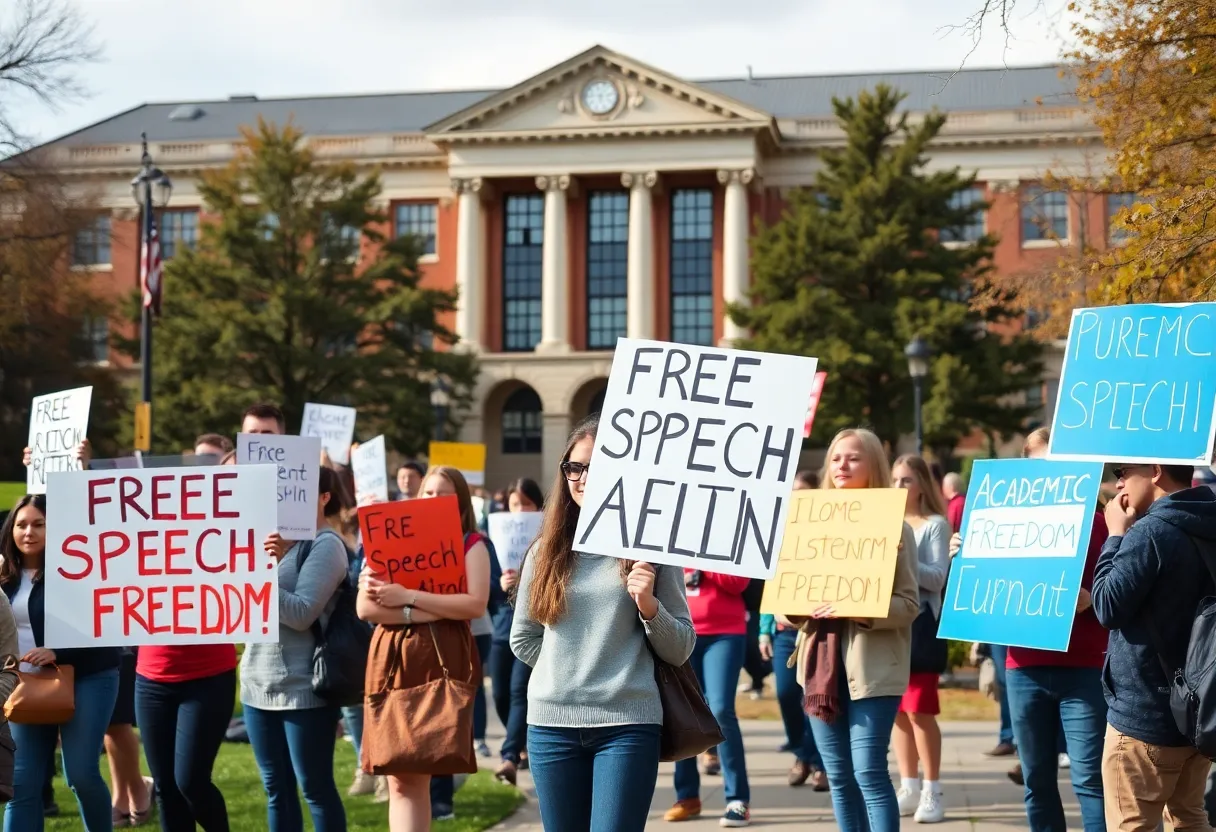News Summary
Columbia University has sanctioned over 70 students involved in pro-Palestinian protests at Butler Library and other campus locations. The disciplinary actions range from probation to expulsion, marking a significant response to disruptions that affected academic activities. The university aims to balance academic freedom with federal pressures regarding antisemitism while facing criticism that these actions undermine free speech. These sanctions may prompt broader discussions on the boundaries of protest within educational institutions.
Columbia University Sanctions Over 70 Students for Pro-Palestinian Protests
In a significant move, Columbia University has disciplined more than 70 students following their involvement in pro-Palestinian demonstrations that took place at Butler Library and other campus locations earlier this year. This is a bold step by the university as it seeks to balance academic freedom with maintaining order and adhering to federal guidelines.
Explaining the Sanctions
The disciplinary actions imposed on students vary widely, with measures ranging from probation to suspensions of one to three years, and even degree revocations and expulsions for some. It has been reported that around 80% of those sanctioned faced suspensions or expulsions, with most of the suspensions lasting at least two years. These actions mark the first significant disciplinary measures taken by the university’s Judicial Board since it was restructured under the provost’s office back in March.
The Protests and Their Impact
The protests had a profound impact on the university environment. The demonstrations included a notable takeover of Butler Library, which didn’t just capture attention but also disrupted academic activities during a crucial time of the academic year. Events like this led to increased scrutiny from the university administration, particularly in the wake of growing concerns around antisemitism on campus.
Federal Pressures and Funding Concerns
Columbia finds itself in a tight spot, facing pressure from the federal government to take a stronger stance against antisemitism, particularly as negotiations to restore federal funding – which had been cut earlier this year – inch closer to a resolution. It’s reported that the Trump administration has placed emphasis on civil rights violations that could affect the university’s funding. In response, Columbia plans to adopt the International Holocaust Remembrance Alliance’s definition of antisemitism and implement mandatory anti-discrimination training sessions in hopes of reconciling these issues.
Mixed Reactions from the Community
The university’s actions haven’t gone unchallenged. Some critics, including voices from organizations advocating for civil rights, argue that these sanctions suppress free speech and undermine the core values of higher education. They claim such measures are oppressive and discourage open dialogue on important global issues. Conversely, the university spokesperson has underscored the necessity of upholding academic integrity and adhering to institutional rules, especially given the disruptive nature of the protests.
The Nature of the Protests
During these protests, there were incidents of vandalism, and some demonstrators went as far as defacing property. The situation escalated to a point where police intervention was required, leading to arrests that included individuals not affiliated with the student body. Such incidents only intensified the debate surrounding the boundaries of protest and academic freedom within the university.
Broader Implications
The actions taken by Columbia University raise critical questions about the intersection of academic freedom and federal policies affecting college campuses. As institutions grapple with balancing student expression and institutional responsibility, this case serves as a reminder of the complex dynamics at play. The discussions following these sanctions may just be the beginning of a much broader conversation about how universities handle protests and uphold their values.
As Columbia moves forward, it will be observed how these decisions affect the campus climate and whether the university can indeed harmonize the pursuit of educational excellence with the need for open and respectful dialogue regarding sensitive socio-political issues.
Deeper Dive: News & Info About This Topic
- ABC News: Columbia University Disciplines 70 Students
- Livemint: Columbia University Expels Nearly 80 Students
- Bloomberg: Columbia Punishes Dozens of Students
- The Guardian: Columbia Library Protest Suspensions
- Gothamist: Columbia Disciplines 70 Students for Protest
- Wikipedia: Columbia University
- Google Search: Columbia University Protests
- Google Scholar: Columbia University Sanctions
- Encyclopedia Britannica: Columbia University
- Google News: Columbia University Student Protests

Author: STAFF HERE PHILADELPHIA WRITER
The PHILADELPHIA STAFF WRITER represents the experienced team at HEREPhiladelphia.com, your go-to source for actionable local news and information in Philadelphia, Philadelphia County, and beyond. Specializing in "news you can use," we cover essential topics like product reviews for personal and business needs, local business directories, politics, real estate trends, neighborhood insights, and state news affecting the area—with deep expertise drawn from years of dedicated reporting and strong community input, including local press releases and business updates. We deliver top reporting on high-value events such as Mummers Parade, Philadelphia Flower Show, and Thanksgiving Day Parade. Our coverage extends to key organizations like the Greater Philadelphia Chamber of Commerce and United Way of Greater Philadelphia, plus leading businesses in telecommunications, food services, and healthcare that power the local economy such as Comcast, Aramark, and Children's Hospital of Philadelphia. As part of the broader HERE network, we provide comprehensive, credible insights into Pennsylvania's dynamic landscape.





